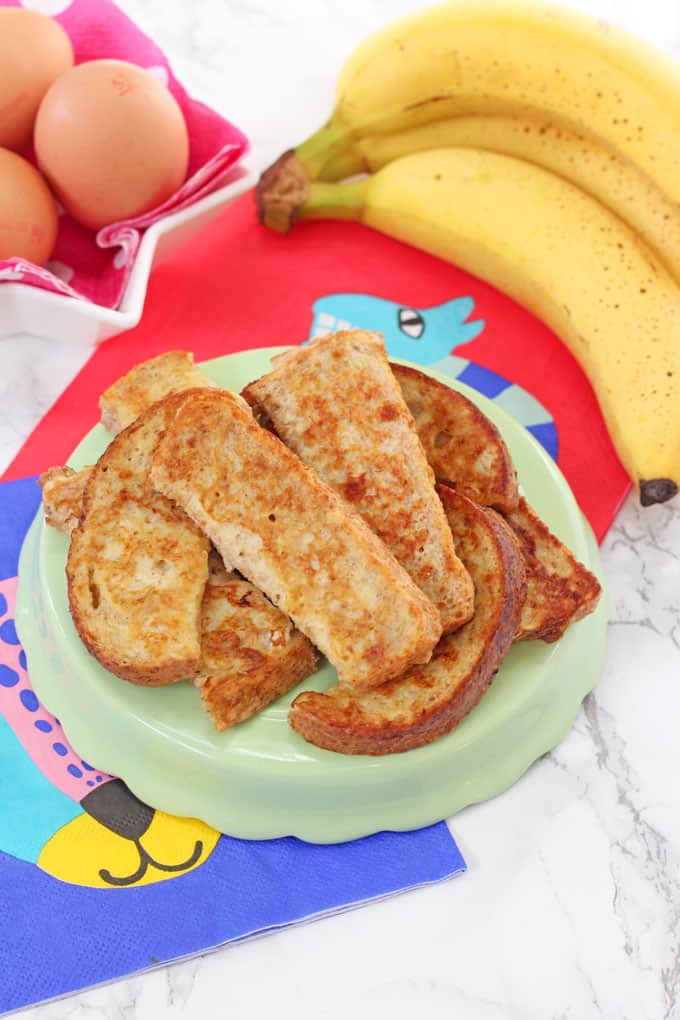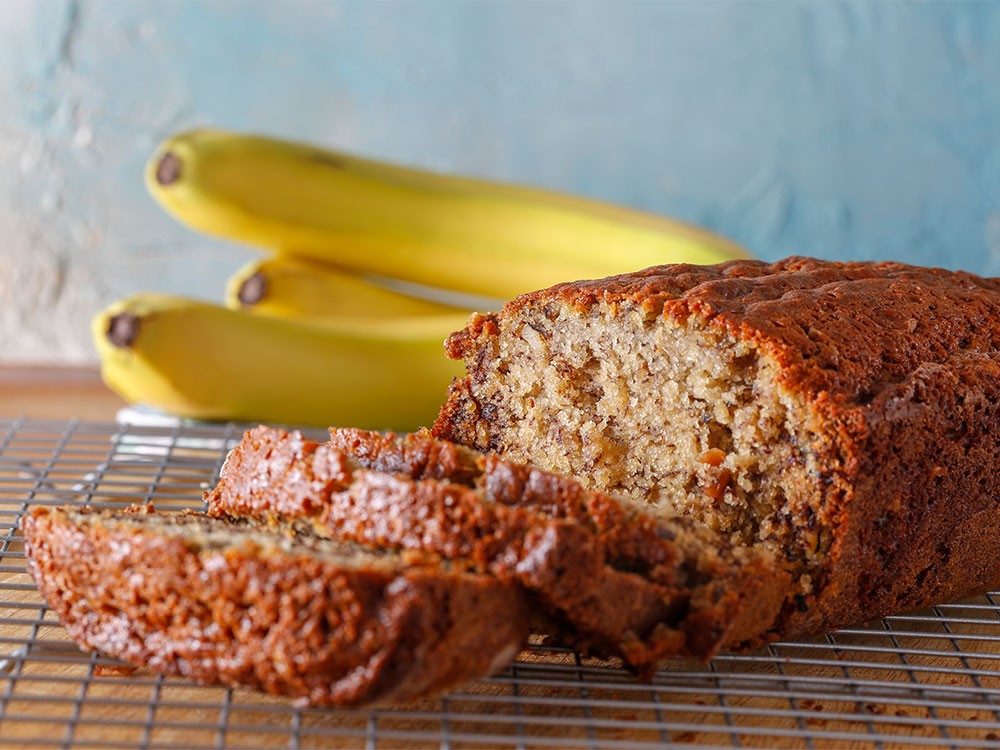Last Updated on January 15, 2025
No, it is not recommended to give banana bread to a baby. Banana bread may contain added sugars, unhealthy fats, and allergenic ingredients that are not suitable for infants.
It is best to introduce plain, mashed or pureed bananas as a first food for babies, around the age of 6 months. Bananas are a nutritious fruit that can be easily digested and provide essential vitamins and minerals. However, it is important to consult with a pediatrician or healthcare professional before introducing any new food to your baby’s diet to ensure their safety and well-being.

Credit: www.myfussyeater.com
When Can I Introduce Banana Bread To My Baby?
Introducing solid foods is an exciting milestone for both babies and parents, and a common question that arises is whether banana bread can be a suitable option. While bananas are a nutritious and often favored choice for babies, the addition of bread introduces extra ingredients and flavors. In this article, we will dive into the recommended age for introducing banana bread to babies, the nutritional benefits of bananas, and the developmental milestones to consider before incorporating solid foods into your baby’s diet.
The Recommended Age For Introducing Banana Bread To Babies
Banana bread can be a delicious and convenient snack for older children and adults, but when it comes to introducing it to your baby, timing is essential. It is generally recommended to wait until your baby is at least ten to twelve months old before offering them banana bread. This is because at this stage, they have likely already tasted and tolerated simple purees and finger foods. Introducing more complex food combinations like banana bread too early could overwhelm their developing digestive system.
Additionally, waiting until your baby is around one year old allows you to focus on offering a variety of whole foods that provide the necessary nutrients for their growth and development. Starting with single-ingredient foods like mashed bananas helps establish a foundation of healthy eating habits before diversifying into baked goods like banana bread.
Nutritional Benefits Of Bananas For Babies
Bananas are packed with essential nutrients that can benefit your baby’s health. They are an excellent source of potassium, vitamin C, and dietary fiber. Potassium helps with proper muscle and brain function, while vitamin C boosts their immune system. The dietary fiber aids in healthy digestion and promotes regular bowel movements.
Additionally, bananas are a natural sweetener, which can be an appealing and healthier alternative to refined sugars found in many processed snacks. Their soft texture and mild flavor make them easy for babies to chew and enjoy. Introducing bananas early on can also help broaden their palate and encourage a taste for naturally sweet foods.
Developmental Milestones To Consider Before Introducing Solid Foods
Before introducing solid foods like banana bread, it is important to assess your baby’s developmental readiness. Some key milestones to consider include:
- Sitting up with minimal support
- Showing an interest in what others are eating
- Ability to pick up objects with their fingers
- Loss of the tongue-thrust reflex, where they push food out with their tongue
These milestones indicate that your baby is beginning to develop the necessary motor skills and coordination to handle solid foods. It is important to consult with your pediatrician before offering banana bread or any other solid food, as they can provide personalized guidance based on your baby’s individual development.
“`
How To Prepare Baby-friendly Banana Bread
Choosing The Right Ingredients For Baby’s Banana Bread
When it comes to making banana bread for your baby, it’s important to choose the right ingredients. Opt for organic,
ripe bananas as they are sweet and packed with nutrients. Be sure to use whole wheat flour, which is rich in fiber and
nutrients. You can also add a touch of cinnamon or vanilla extract for extra flavor. Avoid using added sugars or
artificial sweeteners as they are not recommended for babies under one year old.
Healthy Substitutions For Traditional Banana Bread Recipes
If you have a traditional banana bread recipe that you love, don’t worry, you can still make it baby-friendly by making
healthy substitutions. Instead of using regular butter, opt for unsalted butter or coconut oil for a healthier fat
option. You can also substitute all-purpose flour with whole wheat flour or a combination of whole wheat and almond
flour for added nutrients. Instead of adding refined sugar, use naturally sweet fruits like dates, mashed bananas, or
applesauce to sweeten the bread. These substitutions not only make the bread healthier but also introduce new flavors to
your little one.
Softening The Texture Of The Banana Bread For Easier Digestion
Babies have delicate digestive systems, so it’s important to soften the texture of banana bread to make it easier for
them to digest. Instead of using large chunks of banana, mash them into a smooth puree before adding them to the
batter. You can also add a little bit of yogurt or applesauce to make the bread softer and more moist. Another trick is
to replace some of the oil or butter in the recipe with mashed bananas or yogurt. This not only helps with digestion but
also adds natural sweetness and moisture to the bread.
Safety Precautions And Cautions
Potential Allergenic Reactions To Bananas And Other Ingredients
When introducing your baby to banana bread, it’s crucial to be aware of potential allergenic reactions. Bananas themselves are not a common allergen, but it is still possible for some babies to develop an allergic reaction to them. Additionally, banana bread recipes often include other ingredients, such as eggs, milk, or nuts, which may also have allergenic potential.
Here are some safety precautions to consider when giving your baby banana bread:
- Start by introducing small amounts of banana bread to your baby. This allows you to monitor their response and detect any potential signs of allergy.
- If your baby has a history of food allergies, it’s advisable to consult with their pediatrician before introducing banana bread or any new food item.
- Observe your baby closely for any signs of allergic reaction, such as hives, difficulty breathing, or swelling of the face or lips. If any of these symptoms occur, seek immediate medical attention.
- When preparing banana bread at home, carefully read the labels of all ingredients to ensure they are safe and suitable for your baby’s age and health condition.
Monitoring For Choking Hazards In Banana Bread
Choking hazards can be a concern when introducing solid foods, and banana bread is no exception. It’s essential to take appropriate precautions to minimize the risk of choking.
Consider the following safety measures when giving your baby banana bread:
- Always cut the banana bread into small, bite-sized pieces to reduce the risk of choking.
- Avoid adding any additional toppings or spreads that may increase the likelihood of choking, such as nut butter.
- Make sure your baby is in an upright position while eating banana bread to promote safe swallowing.
- Keep a close eye on your baby while they are eating to ensure they are chewing and swallowing properly.
Gradual Introduction And Assessing Baby’s Tolerance To Banana Bread
When introducing banana bread to your baby’s diet, it’s essential to proceed gradually and assess their tolerance to this new food item. This allows you to identify any adverse reactions or digestive issues that your baby may have.
Follow these steps to ensure a smooth transition:
- Start by offering a small piece of banana bread and observe how your baby reacts. Look for any signs of stomach discomfort, diarrhea, or changes in their stool.
- If your baby tolerates the initial introduction well, you can gradually increase the amount of banana bread they consume.
- It’s essential to note that banana bread should not replace other essential foods in your baby’s diet, such as breast milk or formula.
- If your baby experiences any digestive issues or adverse reactions, consult with their pediatrician for further guidance.
Frequently Asked Questions Of Can I Give My Baby Banana Bread?
What Kind Of Bread Can Baby Eat?
Baby can safely eat soft breads like whole wheat, oatmeal, or multigrain bread, without crusts.
What Is The Best Bread For A 1 Year Old?
The best bread for a 1-year-old is whole wheat or multigrain bread. These types of bread are a good source of fiber, vitamins, and minerals, which are essential for a growing child. It is important to choose bread that is low in added sugars and salt.
Can You Give Mashed Banana To Baby?
Yes, mashed banana is a safe and nutritious food for babies. It is easy to digest and packed with essential vitamins and minerals. Just make sure the banana is ripe and properly mashed before feeding it to your baby.
Can I Give Banana To My 6 Month Baby At Night?
Yes, you can give banana to your 6-month-old baby at night. Bananas are a good source of nutrients and easy for babies to digest. However, make sure to start with small, mashed pieces and watch for any allergic reactions. Always consult your pediatrician before introducing new foods to your baby’s diet.
Can Babies Eat Banana Bread?
Yes, babies can eat banana bread as long as it is made with safe ingredients and appropriate for their stage of development.
Is Banana Bread A Healthy Choice For Babies?
Banana bread can be a healthy choice for babies when made with wholesome ingredients like whole wheat flour and mashed bananas.
Conclusion
Banana bread can be a delicious treat, but is it safe for your baby? While banana bread itself is not harmful, it’s important to consider the potential risks and benefits for your little one. Making a homemade version with simple, wholesome ingredients can be a healthier option.
However, it’s crucial to consult with your pediatrician before introducing any new food to your baby’s diet. Remember, their delicate digestive system may not be ready for certain ingredients. Always prioritize your baby’s health and well-being when making food choices for them.

